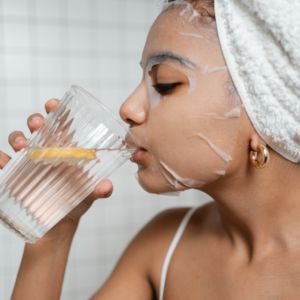I get asked all the time about why I decided to become a dermatologist. The short answer is this. Acne. I started to get spots when I was about 12 years old. My dad bought me Clearasil and told me that I would grow out of it. He’d grown out of it when he was my age after all, but not before developing scarring on his cheeks which is still there today in his sixties. So, I used my facewash and sometimes a bit of toothpaste (or Sudocrem or whatever happened to be knocking about on the bathroom shelf for that matter) and patiently waited for it to go away.
Having grown up in South Africa, my mum was always very concerned about skin cancer. I remember very clearly, later on as a teenager, being taken to a dermatologist to have a mole on my right shoulder checked. When I sat down on the examination couch the first thing the specialist said to us was “Never mind the mole. What are you doing about her acne?” This was just the start of my lifelong battle with breakouts, and harsh as it sounded back then, I was relieved for the validation that this thing that was a source of real unhappiness to me was deserving of proper attention and that now we were really going to do something about it. This is where my fascination with skin health began and how my passion and determination to help others feel good about their skin started.
Acne is the medical term used to describe spots or breakouts. It is easily the most common skin concern there is, affecting as many as 85% of teens. Unfortunately, research shows that more and more of us are continuing to suffer with it in our twenties, thirties and beyond meaning that spots are definitely not just a teenage issue. In fact, it is estimated that up to 20% of adult women are still battling blemishes. When you think that acne can lead to scarring, poor self-image and loss of confidence, this amounts to a big problem.
If you’ve suffered with persistent acne, you’ll recognise the feeling that your face never feels clean. No matter how much time or money you spend on grooming, you still feel like a spotty mess. You long to be one of those carefree people who wakes up 5 minutes before they need to leave the house in the morning. Instead, you have to put aside a full 30 minutes to try and painstakingly conceal each and every spot and you definitely need to get to the bathroom first if you have a new partner for fear that they might reject you if they knew what you really looked like.
Yes, some people can manage the occasional pimple at home with appropriate store-bought products or advice from a GP. Many others are fed up by a lack of improvement and are understandably worried about developing dark marks or permanent scarring if their symptoms are left unchecked. Emotional scarring should not be downplayed either as acne erodes self-esteem, causing sufferers to feel embarrassed and isolated. It doesn’t have to be like this! If you want really effective treatment for persistent acne or scarring, come see me in the clinic to talk about the options because there is plenty we can do. As well as prescriptions and procedures that really work, I’m keen that you have a skincare plan that helps you maintain the results in the longer run so you’ll want to show your skin off, not hide away.
© 2018 Dr Justine Kluk. Any redistribution or reproduction of part or all of the contents of this post in any form is prohibited. You may not, except with our express written permission, copy, distribute or commercially exploit the content. Nor may you transmit it or store it in any other website or other form of electronic retrieval system.






